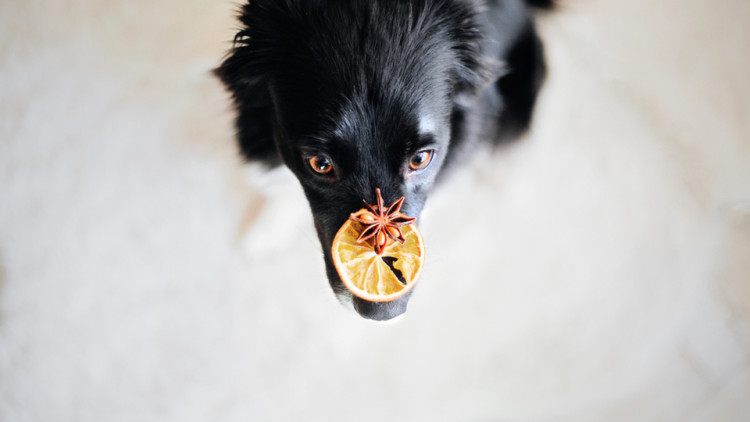For humans, oranges are a healthy snack rich in nutrients like vitamin C - but what about our four-legged friends? Can dogs eat oranges?
The answer is yes, dogs can eat oranges, but only within reason. These citrus fruits are perfectly safe, beneficial even, when properly fed in moderate amounts. If your dog eats too many oranges, they could get an upset stomach and develop digestive issues, among other health problems. Keep reading to learn more.
Pro tip: Does your dog or cat have a habit of swallowing things they shouldn’t? Gastrointestinal issues are among the most common pet insurance claims for dogs, and more than 90% of pets will experience an emergency once in their lifetime. With pet insurance, you can focus more on your dog’s well-being and worry less about finacing the cost of their critical care
Table of Contents:
- Benefits of oranges for dogs
- Are oranges dangerous to dogs?
- How many oranges can dogs eat?
- Can dogs eat orange peels, seeds, and sith?
- Can dogs eat mandarin oranges, tangerines, or clementines?
- Can dogs eat other types of citrus fruits?
- What about orange juice for dogs?
- A word on orange poisoning in dogs
- Diagnosing Orange Poisoning in Dogs
- Treating orange poisoning
- How to serve oranges to your dog
- Key Takeaways
Benefits of oranges for dogs
Oranges are rich in dietary fiber, potassium, thiamine, and folate while being low in sodium. They also contain high levels of vitamin C, which can boost your pup’s immune system and help them keep diseases at bay.
While it is true that pups produce vitamin C on their own, if your canine friend performs a vigorous physical activity or is frequently stressed, their liver may not be able to synthesize vitamin C, so consuming oranges can be beneficial for their well-being. Even if this is not the case with your dog, a little extra vitamin C won't hurt them as it is a water-soluble vitamin that will be excreted.
Some experts also believe that vitamin C can also help clean your pup’s stomach if they get their teeth on more toxic foods (like certain types of nuts). Oranges are also a great alternative to other calorie-rich treats if your canine companion is overweight.

Are oranges dangerous to dogs?
While canines of all breeds, sizes, and ages can safely eat oranges, they should be avoided in dogs with diabetes, as well as in overweight dogs. Even though the natural sugar found in this citrus fruit isn’t inherently bad, it can cause a spike in blood sugar in diabetic pups and can lead to surplus calories if given in large amounts.
The natural sugar, as well as the acidic nature of oranges, can also cause stomach upset, so dogs with sensitive gastrointestinal systems should not be fed oranges at all. If you are not sure whether your canine best friend falls in this category, offer them a small piece of orange the first time and see if there’s any reaction.
Finally, some pups might find it difficult to swallow oranges if not prepared properly. If orange slices still have peels or seeds on them, be sure to remove these parts in order to prevent choking issues.
How many oranges can dogs eat?
In general, one or two orange segments a day should be enough for your pooch. However, the breed and size of your dog might also affect how their body digests oranges. Therefore, larger dogs can tolerate bigger amounts better than smaller dogs. That means that German Shepherds and Akitas may be able to eat two to three orange segments without a problem, whereas smaller breed dogs like Pomeranians and Chihuahuas would probably end up with a stomach upset if they ate the same amount.
In addition, although treats should not make up more than 10% of your pet’s daily calorie intake, the same amount of orange would comprise a higher proportion of a small pup’s daily calorie intake compared to a bigger dog.
Puppies can also eat oranges, but they might be more susceptible to gastrointestinal upset than adult dogs. For that reason, it’s recommended to offer puppies very small amounts of orange, with the seeds and peels removed.
Oranges are also rich in dietary fiber, so if you feed them to your furry friend in large amounts, they can cause digestion issues. If your pet has a sensitive digestive system, be careful how much orange you are feeding them. If you notice vomiting, diarrhea, or other unusual behavior after giving your dog oranges, you should stop at once.
If your pup eats too many oranges and you notice anything out of the ordinary, make sure to contact your vet right away.
Can dogs eat orange peels, seeds, and pith?
Dogs should avoid eating orange peels and seeds as these parts of the fruit can potentially contain trace amounts of certain toxic compounds. Make sure to fully remove the seeds before offering orange slices to your pooch, as they can also be a potential choking hazard.
When it comes to orange peels, even though they’re not toxic to dogs, orange peels are difficult to digest and can cause stomach upset. In extreme cases, orange peels might create a dangerous (and potentially life-threatening) blockage in their gastrointestinal tract, which could require emergency surgery.
On the other hand, the orange pith (the white layer between the rind and flesh) is packed with dietary fiber and antioxidants. It is also free of sugars and acid, which means that it won’t upset your pet’s stomach. As long as the pith is removed from the peel, it’s the most beneficial part of the fruit.
Pro tip: The cost for diagnosis and treatment of gastrointestinal issues can vary from $200 - $8,000. If your dog has pet insurance, you could be reimbursed for up to 90% of this cost, depending on your policy.
 (Image source: PetMD)
(Image source: PetMD)
Can dogs eat mandarin oranges, tangerines, or clementines?
Yes, dogs can safely eat these citrus fruits so long as they are peeled and fed in moderate amounts. Mandarin oranges are somewhat flat on the ends and have a slightly different flavor than standard oranges. Clementines and tangerines both belong to the group of mandarine oranges, so the same rules apply as they do for regular oranges.
Note that mandarins, tangerines, and clementines are somewhat sweeter, so you need to be extra careful with diabetic and overweight canines. It’s best to only feed these citrus fruits to dogs that are in a good state of health. As a rule of thumb, feed no more than a half of clementine or tangerine for smaller dogs and whole fruit for larger dogs in a given day.
Can dogs eat other types of citrus fruits?
The fleshy part of citrus fruits like lemons, grapefruits, and limes is safe for dogs but most pooches don’t like them because they are very acidic and tart. The seeds and peels of all citrus fruits present a choking hazard and can also cause gastrointestinal issues.
What about orange juice for dogs?
While juicing oranges would be a way to avoid a choking hazard, orange juice is not good for your dog. Orange juice - even when it’s freshly squeezed - is a concentrated source of citric acid and natural sugars found in the fruit. Dogs should avoid sugar in general because it can cause a number of health issues, and the acidic content of orange juice can destroy tooth enamel over time. If you want to keep your four-legged friend hydrated, water is the best option.
A word on orange poisoning in dogs
As mentioned earlier, oranges are rarely toxic to dogs unless they are consumed in large amounts. The main toxicity is in the peel, which is also a choking hazard because it’s very thick and difficult to digest.
The most common clinical signs of orange poisoning in dogs include:
- Diarrhea
- Vomiting
- Drooling
- Muscle tremors and spasms
- Weakness
- Intestinal obstruction
- Depression
Diagnosing orange poisoning in dogs
To diagnose your dog, the vet will perform a physical exam. They may also use an endoscope in order to check for obstructions or inflammation in your dog’s throat, upper airway, and esophagus. If there’s any foreign material, the vet will insert a tool in order to remove it.
If your pet is showing any type of cardiac symptoms, an electrocardiogram (EKG) might be performed to check for any abnormalities. Urine and blood tests will be run as well, including blood glucose, serum biochemistry profile, and CBC. Additional tests that might be needed are CT scan, ultrasound, x-rays, and MRI.
Treating orange poisoning in dogs
Treating orange poisoning is similar to other cases of poisoning, which include:
- Eliminating the poison by giving an emetic (ipecac or peroxide) in order to induce vomiting, as well as activated charcoal to absorb any toxins that are left.
- Detoxification. The vet might perform a gastric lavage in order to rinse away any undigested fruit residue. IV fluids will also be given to rehydrate the animal and flush their kidneys.
- Medication. The vet will likely give your pet antiemetics if they’re still vomiting and stomach protectants for gastric distress.
In most cases of orange poisoning, hospitalization is not necessary, so your vet will probably send you home after treatment. Observe your pet’s recovery and behavior in the first few days after treatment and make sure to provide enough fresh water along with food that’s easy to digest.
How to serve oranges to your dog
When feeding your dog oranges, be sure to peel them and remove the seeds. Don’t give the whole fruit and instead, divide it into segments.
You can add orange slices into a mixed salad made of dog-friendly fruits and vegetables such as apples, carrots, cucumber, and celery. You can also use some orange juice as a dressing.
Another option is to freeze orange segments and feed them with your pooch as a refreshing summer snack.
Stay away from store-bought orange juices and other orange-flavored snacks and drinks as they are full of artificial sugars and are very bad for your pup’s health.
Key Takeaways
- Oranges are not toxic and most dogs can eat a few slices without experiencing any health issues.
- Just like with any human food, moderation is key, as feeding dogs too much orange fruit can cause digestive issues and health concerns.
- Dogs that are overweight or diagnosed with dibetes should keep clear of this sugary citrus fruit.
- As always, it's a good idea to check with your vet before offering your dog human foods like oranges because they'll know more about your pup's unique medical history.
